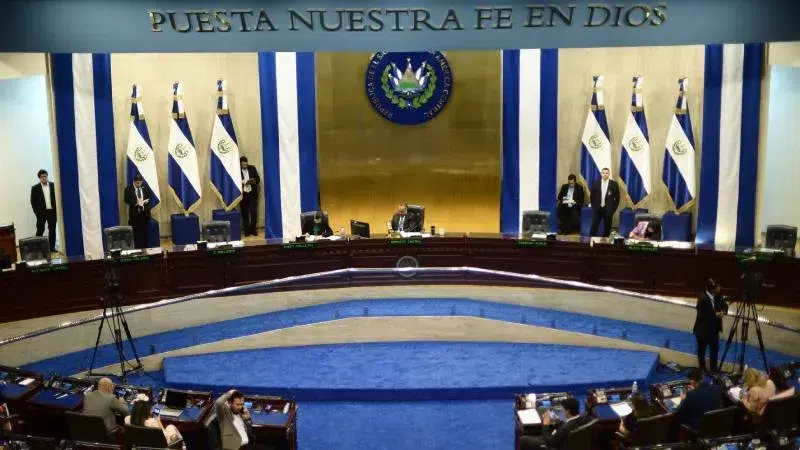The fewer the number of deputies in the Legislative Assembly, the lesser the probability that the opposition parties will be able to obtain enough seats to control the ruling party effectively.
This is what electoral experts warn when analyzing the controversial proposal of Nuevas Ideas to reduce 20 seats in the Legislative Body.
This Monday, the president of the Legislative Assembly, Ernesto Castro, said in the interview with Frente a Frente that it is very likely that Nuevas Ideas will present in the following days initiatives to reduce the number of deputies of the Assembly and municipalities in the country.
Without explaining with whom or how they have elaborated the analysis of such initiatives, the pro-government legislator detailed that in the discussions, it is being discussed that there should be 64 legislators.
However, specialists consider this figure illogical and point out that a random number can only be chosen after first considering the current delimitation of the country’s districts.
Experts warn that the smaller the constituencies are, the more complicated it becomes for small parties to obtain seats.
For example, Malcolm Cartagena, an expert in electoral law, told El Diario de Hoy that reducing deputies “is a delicate action.”
Specifically, Cartagena explained that in most departments that obtained three seats, Nuevas Ideas won two deputies in the last elections, and the other parties got one.
If this cut of 20 seats were to affect the small constituencies (departments), there would only be a presence of the ruling party in several of these.
Malcolm Cartagena reminded us that the Salvadoran Constitution requires three types of majorities to make decisions in the plenary: half plus one, two-thirds, and three-quarters. This, in his opinion, conditions the number of seats that must be divisible by 2, 3, and 4, that is to say, a multiple of 12. Therefore, according to the expert, fewer than 84 would be 72, 60, and 48.
Therefore, the expert explained that “a lower number, at least maintaining the 14 constituencies, would break the proportionality required by the Constitution, leaving some of them with only two seats” easy to capture exclusively by the ruling party and ignoring that the maximum law requires the representation of minorities.
Reducción de diputados golpeará a los partidos minoritarios
Mientras menor sea el número de diputados de la Asamblea Legislativa, también será menor la probabilidad de que los partidos opositores puedan obtener suficientes escaños para hacer un control efectivo del oficialismo.
Así lo advierten expertos electorales al analizar la polémica propuesta de Nuevas Ideas de reducir 20 escaños en el Órgano Legislativo.
Este lunes, el presidente de la Asamblea Legislativa, Ernesto Castro, dijo en la entrevista Frente a Frente que es muy probable que Nuevas Ideas presente en los próximos días iniciativas para reducir la cantidad de diputados de la Asamblea y de municipios en el país.
Sin explicar con quiénes o cómo han elaborado el análisis de dichas iniciativas, el legislador oficialista detalló que en las discusiones se maneja que sean 64 legisladores propietarios.
Sin embargo, especialistas consideran que este dato es ilógico y señalan que no se puede escoger un número al azar sin antes tomar en cuenta la delimitación actual de las circunscripciones del país.
De hecho, los expertos advierten que mientras más pequeñas sean las circunscripciones, se vuelve más complicado para los partidos pequeños la obtención de escaños.
Por ejemplo, Malcolm Cartagena, experto en derecho electoral, dijo a El Diario de Hoy que reducir diputados “es una acción delicada”.
En concreto, Cartagena explicó que en la gran mayoría de departamentos que obtienen tres escaños, Nuevas Ideas ganó en las últimas elecciones dos diputados y los otros partidos lograron uno.
Si ese recorte de 20 escaños tocara a las circunscripciones (departamentos) pequeños, habría únicamente presencia del oficialismo en varios de estos.
Malcolm Cartagena recordó que la Constitución salvadoreña exige tres tipos de mayorías para tomar decisiones en el pleno: mitad más uno, dos terceras partes y tres cuartas partes. Esto, a su juicio, condiciona un número de escaños que debe ser divisible entre 2, 3 y 4, es decir múltiplo de 12. Por ello, según el experto, los números menores a 84 serían: 72, 60 y 48.
Por tanto, el experto explicó que “un número menor, al menos manteniendo las 14 circunscripciones, rompería la proporcionalidad que por Constitución se exige, al dejar algunas de ellas con apenas dos escaños” fáciles de capturar exclusivamente por el oficialismo y obviando que la ley máxima exige la representación de minorías.

